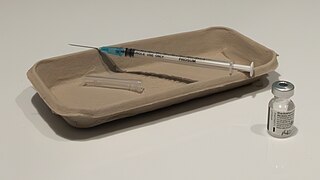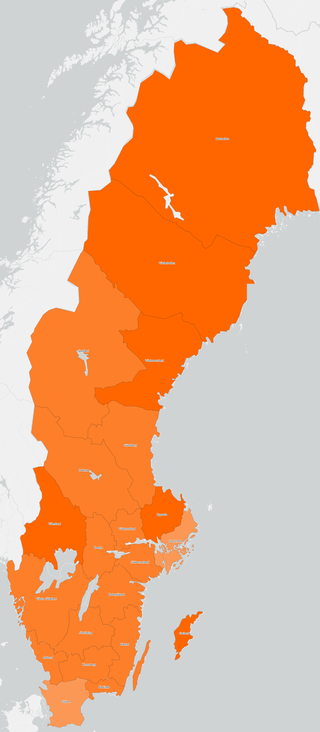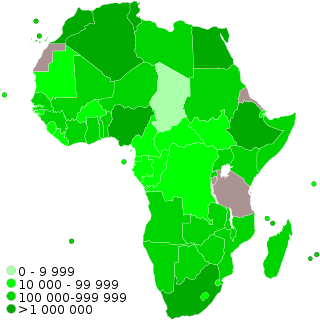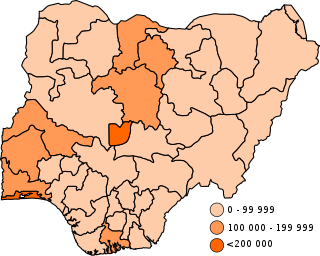Vaccines on order
There are several COVID-19 vaccines at various stages of development around the world.
| Vaccine | Approval | Deployment |
|---|---|---|
| Pfizer–BioNTech | ||
| Moderna | ||
| Oxford-AstraZeneca | ||
| Janssen | ||
| Novavax |
| Native name | Εθνική Εκστρατεία Εμβολιασμού «Επιχείρηση Ελευθερία» |
|---|---|
| Date | 27 December 2020 – present |
| Location | Greece |
| Cause | COVID-19 pandemic in Greece |
| Target | Full immunisation of people in Greece against COVID-19 |
| Participants | 21.091.153 doses administered (30 June 2022) 7.919.254 have received at least one vaccine dose (30 June 2022) 75.4% 72.6% 58.2% |
| Website | Official Website |
The COVID-19 vaccination campaign in Greece began on 27 December 2020. [1] As of the 30th of June 2022, 7.919.254 people have received their first dose (75.4% of total population), and 7.629.060 people have been fully vaccinated (72.6% of total population). A total of 6.119.231 people have received an additional booster shot (58.2% of total population). [2]
There are several COVID-19 vaccines at various stages of development around the world.
| Vaccine | Approval | Deployment |
|---|---|---|
| Pfizer–BioNTech | ||
| Moderna | ||
| Oxford-AstraZeneca | ||
| Janssen | ||
| Novavax |

The global COVID-19 pandemic arrived in Europe with its first confirmed case in Bordeaux, France, on 24 January 2020, and subsequently spread widely across the continent. By 17 March 2020, every country in Europe had confirmed a case, and all have reported at least one death, with the exception of Vatican City.
The COVID-19 pandemic in Latvia was a part of the worldwide pandemic of coronavirus disease 2019 caused by severe acute respiratory syndrome coronavirus 2. The virus was confirmed to have reached Latvia on 2 March 2020, having been brought along with people returning from abroad.
The COVID-19 pandemic was confirmed to have reached the French overseas collectivity of New Caledonia on 18 March 2020. All cases are on the main island of Grand Terre and are related to travel abroad. On 7 May, all cases had recovered.

The COVID-19 vaccination programme in the United Kingdom is an ongoing mass immunisation campaign for coronavirus disease 2019 (COVID-19) during the COVID-19 pandemic in the United Kingdom.

Vaccination against COVID-19 in Sweden started on 27 December 2020 after the approval of the Pfizer–BioNTech vaccine by the European Commission. In Sweden, the Public Health Agency has been commissioned by the government to create a vaccination plan. Sveriges riksbank, the central bank of Sweden, predicts that efficient vaccination against COVID-19 has macroeconomic benefits. As of 20 April 2022, 87.1% of people in Sweden have received at least one dose, with a total of 21,491,717 doses administered.: At least one vaccine has been approved for all age groups 12 and older. Children younger than 12 in high risk groups can also be vaccinated.

India began administration of COVID-19 vaccines on 16 January 2021. As of 4 March 2023, India has administered over 2.2 billion doses overall, including first, second and precautionary (booster) doses of the currently approved vaccines. In India, 95% of the eligible population (12+) has received at least one shot, and 88% of the eligible population (12+) is fully vaccinated.
COVID-19 vaccination in Romania started on 27 December 2020. It was announced that the process would be divided into three phases. Medical personnel would be vaccinated first, followed by the population at risk, and finally by the rest of the population. Vaccination was declared free and non-mandatory. As of March 2022, five types of vaccines were authorized to be used in Romania. This is the largest vaccination campaign in the modern history of Romania.

The COVID-19 vaccination campaign in Albania is a mass immunization campaign that was put in place by the Albanian authorities in order to respond to the ongoing COVID-19 pandemic. It started on 11 January 2021.

The COVID-19 vaccination campaign in Russia is an ongoing mass immunization campaign against severe acute respiratory syndrome coronavirus 2 (SARS-CoV-2), the virus that causes coronavirus disease 2019 (COVID-19), in response to the ongoing pandemic in the country. Russia became the first country to begin a mass COVID-19 vaccination programme on 5 December 2020, starting with primarily doctors, medical workers and teachers. In January 2021, this was extended to the entire population.
COVID-19 vaccination in Angola is an ongoing immunisation campaign against severe acute respiratory syndrome coronavirus 2 (SARS-CoV-2), the virus that causes coronavirus disease 2019 (COVID-19), in response to the ongoing pandemic in the country. As of 15 June 2021, Angola has administered 1,314,375 doses of vaccines.822,109 people with the first dose and 492,266 people fully vaccinated. Angola began their vaccination program shortly after receiving their first shipment of Oxford AstraZeneca vaccine in early March 2021.

COVID-19 vaccination programs are ongoing in the majority countries and territories in Africa, with 51 of 54 African countries having launched vaccination programs by July 2021. As of October 2023, 51.8% of the continent's population is fully vaccinated with over 1084.5 million doses administered.

Bhutan has promised a free COVID-19 vaccination to all of its citizens, both inside and outside the country. It started mass vaccinations on 27 March 2021.

During the COVID-19 pandemic in Croatia, vaccination against COVID-19 began on 27 December 2020. The Croatian government ordered vaccines together with the EU. 8.7 million doses have been ordered. As of 3 February 2022, over 2.2 million people were fully vaccinated, corresponding to a 63% vaccination rate of the country's population.

COVID-19 vaccination in Nigeria is an ongoing immunization campaign against severe acute respiratory syndrome coronavirus 2 (SARS-CoV-2), the virus that causes coronavirus disease 2019 (COVID-19), in response to the ongoing pandemic in the country. Vaccination began on 5 March 2021. As of 28 February 2022, 17,914,944 people have received their first dose a COVID-19 vaccine, and 8,197,832 have received their second dose.

The COVID-19 vaccination campaign in Germany began on 26 December 2020.

The COVID-19 vaccination in Singapore is an ongoing immunisation campaign against severe acute respiratory syndrome coronavirus 2 (SARS-CoV-2), the virus that causes coronavirus disease 2019 (COVID-19), in response to the ongoing pandemic in the country. Singapore has a very high vaccination rate, with more than 92% of its total population having completed their vaccination regimen.
COVID-19 vaccination in Iceland is an effort to immunize the adult population of Iceland due to the COVID-19 pandemic. As of July 2021, more than 260,000 individuals had received at least one dose of COVID-19 vaccine, which was over 78% of the country's population. On November 21, 2021, 90% of the target population had been fully vaccinated, while around 1 in 5 people had received a booster on top of that; by December 9, 2021, the share of the population having received a booster shot exceeded 50%. On December 13, 2021, the country began offering Pfizer vaccinations to children aged 5–11.

COVID-19 vaccination in Taiwan is an ongoing immunization campaign against severe acute respiratory syndrome coronavirus 2 (SARS-CoV-2), in response to the ongoing pandemic in the country.

The COVID-19 vaccination in Spain is the national vaccination strategy started on 27 December 2020 in order to vaccinate the country's population against COVID-19 within the international effort to fight the COVID-19 pandemic.

The COVID-19 vaccination campaign in Ukraine is an ongoing mass immunization campaign for the COVID-19 pandemic in Ukraine.